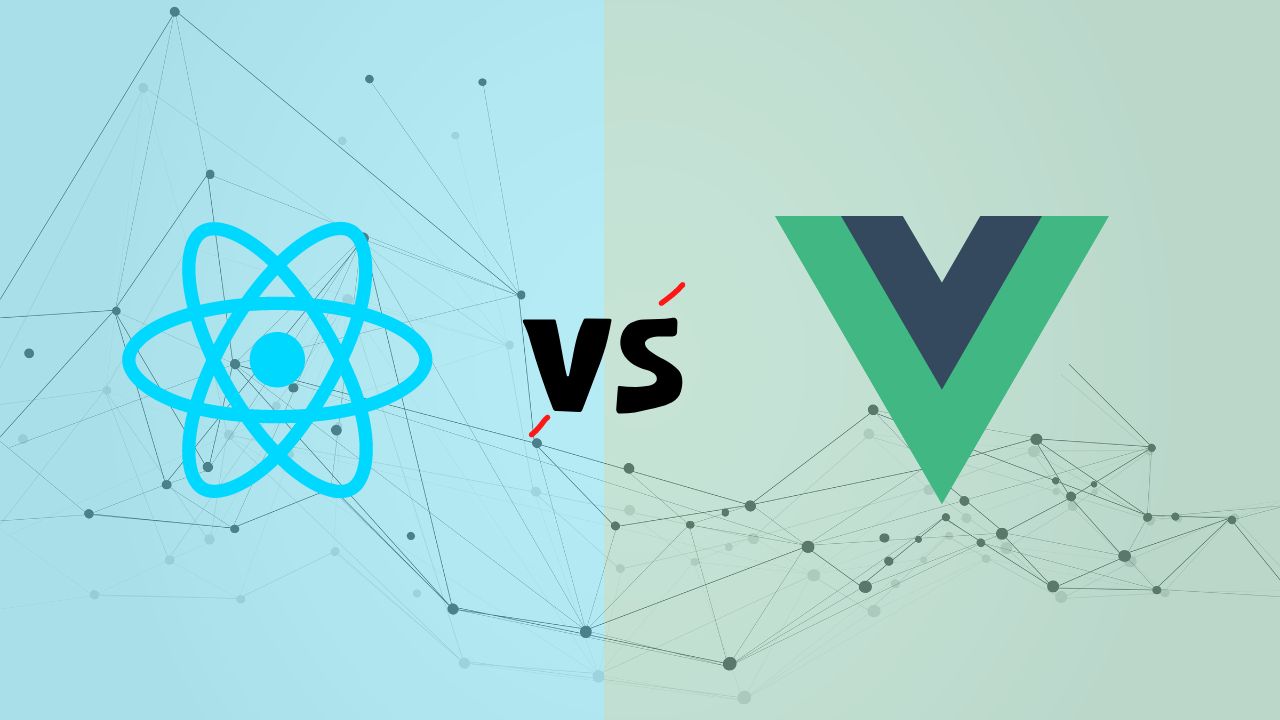React vs Vue - which one is better in 2023?

Vue and React are two of the most rapidly expanding frontend development technologies, and there are several reasons for their appeal among company owners and developers.

Liviu
03 Aug 1689, 0:00 am
Are you looking for the best JavaScript framework in 2023?
When considering which JavaScript framework to use for a new or existing project, most people compare Angular vs React vs Vue. In this post, I will compare React with Vue. Keep on reading as we are deep diving into this matter, comparing two of the most famous JS frameworks in 2023 and over the past years.
What exactly is Vue?
Vue, named a "progressive framework" by its designer Evan You, had its public debut in 2014. Originally used mainly in China, this famous JavaScript framework is now utilized globally and is regarded as one of the finest solutions for designing attractive user interfaces and Single Page Applications (SPAs).
Vue supports two-way binding and employs a virtual DOM, which is a clone of the real DOM. However, the main reason people are attracted to this framework is its progressive architecture, which enables developers to progressively enhance and refactor old applications. This may be accomplished by relocating each feature one at a time.
Vue is an open-source project that is constantly being improved and maintained by its increasing community. Adobe, Trustpilot, BMW, Vice, Nintendo, Euronews, Grammarly, and many more well-known brands are linked with Vue.
What exactly is React?
React is a JavaScript library used in web development for interactive components on websites and UIs. It is not a framework. React, which was created by Jordan Walke while working at Facebook, is also used to create SPAs and mobile applications.
Because it employs components—isolated sections of code—that may be utilized to construct more complicated logic and UIs, this JS library provides a lot of versatility. It likewise interacts with HTML documents through a virtual DOM, where all elements are represented as js objects.
Learning curve
From my experience, Vue tends to make our developer life a bit easier, with better documentation and an API that makes sense, which is very much similar to the native web API. React is also easy to pick up and start your project, but many times you have to figure things out on your own, especially for larger projects. Anyhow, if you have some experience with JS or any other frameworks, both of these frameworks will seem familiar, just try them both and see for yourself.
Performance of Vue vs. React
When it comes to performance, Vue and React are about equivalent since they share common parts. They employ lazy loading and virtual DOMs to improve speed and reduce loading times.
Vue and React both offer good performance, but each has its own perks. Memory allocation and setup times, for example, are somewhat faster with Vue, however, during runtime, React takes the lead.
Nonetheless, there are instances when the two function significantly differently. As an example:
When the state of a React component changes, all of the components in its subtree are re-rendered. These dependencies are recorded in Vue, preventing wasteful re-rendering.
Popularity of Vue vs. React
The number of stars on a framework or library's Github repositories is a decent metric to gauge its popularity.
As you can see, Vue has been up there with React among the most popular frameworks since 2017.
Vue has 200K Github stars as of 2023, making it the most popular JavaScript framework. React is in the second position with 196K stars and is still growing.
According to Google Trends, firms were trying to employ React engineers during the last 12 months, followed by Vue and Angular in a close race. With this in mind, React jobs are the most popular, followed by Angular and finally Vue—at least, that's how the job market appeared in 2023.
Another consideration would be the users of each framework. Trustpilot, BMW, Vice, Nintendo, Adobe Portfolio, Euronews, and many more companies are among Vue's users. React is used by the BBC, Airbnb, Facebook, PayPal, Netflix, Instagram, and many more well-known companies.
State management in Vue vs. React
The word state refers to the data that all of your UI components share. Naturally, as your application expands, it becomes more difficult to administer. In both cases, the community provides a few libraries for managing the state, making debugging easier. For react we have Redux, Mobx, or context, while for Vue we have Reactivity API, Vuex, or Pinia. Picking the right tool to manage the state of your application may depend on the scale and complexity of the project.
Tooling
React offers a third-party CLI tool called create-react-app that provides CLI APIs for developing applications with basic architecture. The tool substantially simplifies app creation, scripting, and dependency installation. One of the key benefits of Vue CLI is the ability to manage project setup and scaffolding without having to worry about folder organization. Other advantages include instant prototyping, installing plugins at any moment, and referencing configuration settings.
Server-side rendering (SSR)
Both frameworks are backed by the massive open-sourced SSR frameworks, inspired by each other, with similar names, Next for React and Nuxt for Vue. Next.js claims that it provides the finest developer experience with all of the capabilities you need for production, like hybrid static and server rendering, TypeScript support, smart bundling, route pre-fetching, and no configuration required. Next is the VueJS framework that will let you confidently create your next web application with ease. It comes packed with features designed to improve developer efficiency and experience.
Conclusion: which JS framework should you choose in 2023?
Each framework offers benefits over the other and has a lot more to be said about. Vue, for example, is lighter and faster, easier to learn with better documentation, and it is handy thanks to its templates and simple syntax. React, on the other hand, provides greater flexibility for bigger, more sophisticated projects and may land you a job faster, as it's in high demand at the moment. It's also simpler to test, more suited for mobile app development and provides more information in the event of a mistake.
As a result, the answer is dependent on what you want to create. The easiest method to choose a tool for a certain situation is to experiment with it yourself. You may try both frameworks on smaller projects to see which one works best for you.
I made my choice many years ago, and my favorite JS framework is Vue.